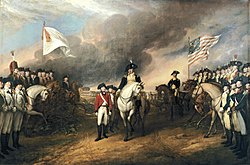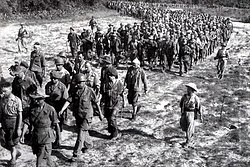Decolonization
Decolonization is when a colony of any country becomes independent. Thus, decolonization is the opposite of colonization. Sometimes, a colony may not get full freedom, but may become part of another country or even the part of the country which colonized it. This is also decolonization.
In some cases, decolonization may result after non-violent discussion. In a relatively small number of cases, decolonization happens only after armed struggle and revolt. Decolonization is different from the break-up of traditional empires like the Mongol Empire or the Ottoman Empire. Decolonization generally means independence of non-Europeans from European rule. Thus, the break-up of the Union of Sweden and Norway and the independence of Manchukuo from the Empire of Japan were not decolonization. Major decolonization occurred in the 20th century. It began with the independence of Pakistan and India in 1947 from the British Empire. Soon after, many countries of Africa became independent from the rule of many suzerainty countries of Europe.
Decolonization Media
The Chilean Declaration of Independence on 18 February 1818
Prince Pedro proclaims himself Emperor of an independent Brazil on 7 September 1822.
Members of the Irish delegation for the Anglo-Irish Treaty negotiations in December 1921
Surrender of Lord Cornwallis at Yorktown in 1781
French poster about the "Madagascar War"
Captured French Union soldiers from Điện Biên Phủ, escorted by Vietnamese communist troops, 1954
Manuel L. Quezón, the first president of the Commonwealth of the Philippines (from 1935 to 1944)









